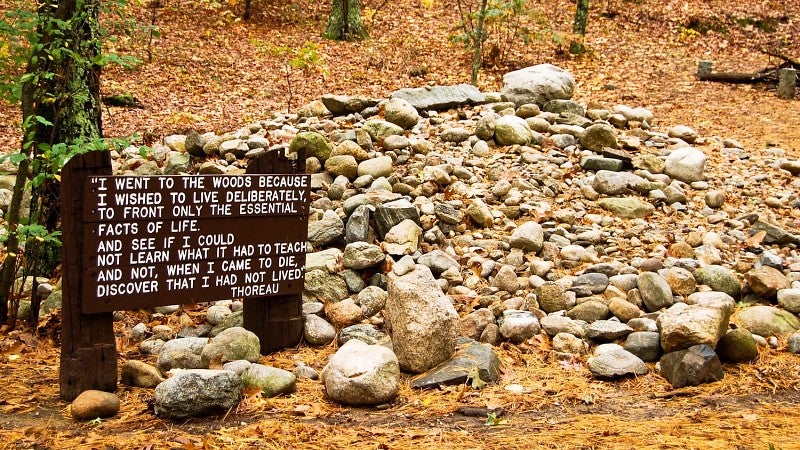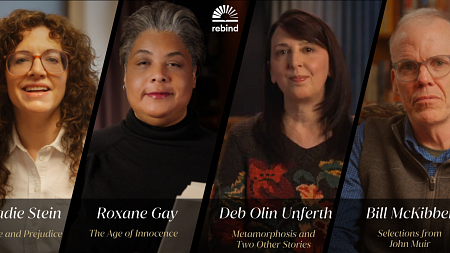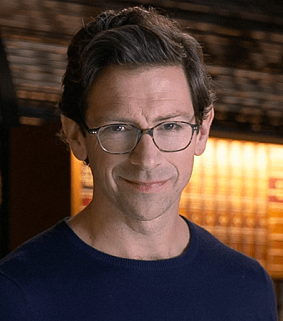
April 24, 2025 - 9:00am
When John Kaag’s mother forced him to take philosophy lessons from his Latin teacher in high school, he didn’t imagine it would lead him to a career in philosophy. But after reading "Walden" by Henry David Thoreau — and literally swimming across Walden Pond — he developed three goals: to be a philosophy professor, to teach about Thoreau and to live in Concord, Massachusetts. Not only did he achieve all three of his original goals, he also recently co-founded Rebind, an AI-driven website that allows you to read classic books alongside literary experts such as Margaret Atwood and Roxane Gay.
Regarding philosophy, Kaag points specifically to "Walden" for inspiring his love for American philosophy and transcendentalism, which emphasized individualism, self-reliance and the divinity of nature. In fact, his love of nature and the foundations of American philosophy guided Kaag towards University of Oregon.
“U of O has one of the very few philosophy departments that allows you to study classical American philosophy, so Emerson, Thoreau, William James, John Dewey, these characters who formed our culture and our intellectual culture, but typically aren't regarded as serious academic philosophers,” Kaag said. “U of O has a program that does take them very seriously and that's what drew me to U of O.”
Oregon also appealed to Kaag because of the structure of the program. The department acknowledged that emphasizing epistemology, social and political philosophy was the most beneficial way to understand the concepts students were learning, as opposed to studying ethics alone. As a student, he was allowed to explore how ethics and theories of truth correlated, something he felt might not be available elsewhere.
“I selected U of O because it was the most hands-on program with its doctoral students. It was incredibly personal,” Kaag said. “We were doing work in the community, doing work in prison systems. Faculty regarded this as part and parcel of working in philosophy, which I found really valuable.”
Kaag obtained his doctorate in philosophy from UO in 2007 and is now a professor of philosophy at University of Massachusetts-Lowell. He teaches Thoreau and has written several books, which blend memoir and philosophical text. "Hiking with Nietzsche: On Becoming Who You Are" and "American Philosophy: A Love Story" have garnered attention and acclaim. The latter earned him NPR Book of the Year, as well as a positive review in "The New York Times," leading to an unusual request.
How Rebind was born
John Dubuque, who studied philosophy at University of Southern California, had been asking experts in the field to perform one-on-one tutorials with him, and he reached out to Kaag to do the same. He wanted Kaag to take him through William James and "The Varieties of Religious Experience" during a six-week course, which Kaag agreed to. Through this tutelage, Rebind was born.
“During that time, ChatGPT was coming out, and he was beginning to use ChatGPT to augment his lessons with me. And he joked around he was like, ‘Wouldn't it be cool if we could make an AI bot that would help students through difficult texts?'” Kaag said. “I laughed and I was like, ‘Get real. Not going to happen.’”
Dubuque was serious about this idea and urged Kaag to provide 30 hours of audio commentary on any book. Kaag obliged, choosing Walden for his commentary, and after this initial effort, the pair decided to expand to more books. For example, Atwood provides commentary on Charles Dickens' "A Tale of Two Cities," and Gay shares her thoughts on Edith Wharton's "The Age of Innocence" through AI-powered conversations.
How Rebind uses AI to make literature interactive

Rebind allows readers to not only read books, but also to interact with original commentary that an expert provided regarding a specific text. Through the use of AI, Kaag, Dubuque and their third partner, professor Clancy Martin, allow readers to ask questions about a text, and then receive verbatim responses from authors like themselves, John Banville and Atwood.
This technology will benefit both individual readers and groups alike. Rebind is already in select classrooms for a trial run, but the education market isn’t their only interest. Kaag wants groups like book clubs and Bible studies to be able to utilize this tool also.
“Imagine if it's not just one person you get to interact with, but lots of people, and you get to do that in real time as you work your way through the book. Using AI, you can actually surface people's commentary very quickly,” Kaag said. “If you have an idea about a book and you put in a comment, the large language model can go seek the exact verbatim commentary from this well of commentary that we've created and pull it into conversation with you, and it can be from anyone who's gone through that book.”
Rebind is prepping for several expansions soon, including getting 1,000 books onto the site by the end of the year, including the Bible. Kaag also hopes they can start adding more contemporary texts onto the site, allowing authors to potentially provide commentary on their own works.
“We're aiming to get the electronic licenses to contemporary books that either are coming out in the future, or were published after 1927,” Kaag said. “Our hope is that publishers will see the advantage of putting their own books on the site. It would be kind of like the director's cut.”
On Rebind, companion AI allows readers to read a text and hit “Inspire,” a button that prompts readers with a question that they provide the answer to. The answers are then saved to the users’ profiles and can be stored and redistributed to other people.
“AI creates the plumbing for human interactions, and I'm very interested in that, and I don't see that as nearly as diabolical as pretending that something that AI produces is actually human,” Kaag said. “I want to use AI to distribute that which is actually human to a wider audience.”
Kaag's hopes for Rebind
Kaag’s main hope for Rebind is that more and more people will be able to access and understand previously difficult texts. With reading not being “in vogue,” he believes that this sort of technology will be a useful tool to encourage more people to “just keep plugging” through texts they might’ve once given up on.

He also feels that his time in UO’s philosophy department was fundamental to getting him to where he is now. Finding what he was passionate about going into graduate school and sticking with it encouraged his love of philosophy, which led him to the school. Having the opportunity to apply his philosophy lessons in real-world settings taught him the power of asking questions about the world around him, and how to understand his own experiences.
“I feel so incredibly lucky to have spent time at U of O. I look back on that time, and I wish I had been more grateful and more appreciative of that time when it was passing,” Kaag said.
—By Grace Connolly, College of Arts and Sciences
